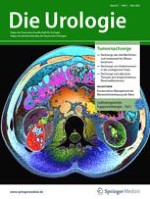Erschienen in:

01.09.2006 | Leitthema
LOH (late onset hypogonadism) oder „aging male“
verfasst von:
PD Dr. H. Sperling, F. Jockenhövel, W. Stackl, F.-M. Köhn, G. Ludwig
Erschienen in:
Die Urologie
|
Sonderheft 4/2006
Einloggen, um Zugang zu erhalten
Zusammenfassung
Das Testosterondefizit des alternden Mannes (LOH, late onset hypogonadism) oder „aging male“ ist aufgrund der fehlenden Evidenz der vorliegenden Daten für Andrologen eine Herausforderung. Diese Herausforderung muss sowohl in der Grundlagenforschung als auch in der klinischen Beobachtung und Anwendung angenommen werden, damit wir über das Niveau der bestehenden Leitlinien hinaus unsere Patienten beraten und behandeln können.